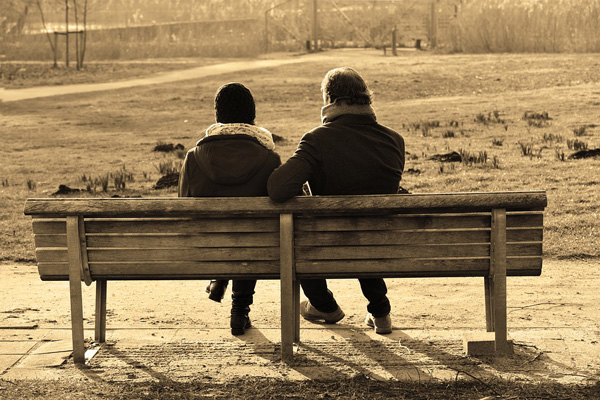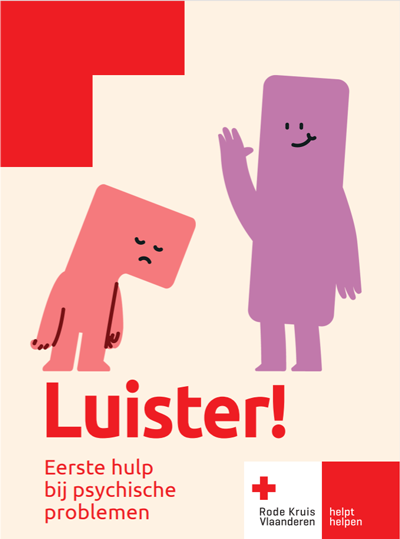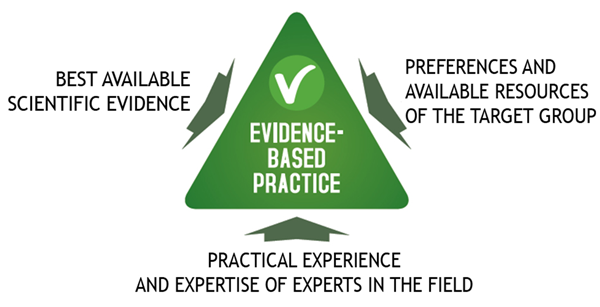Supporting each other: Listen! to evidence, expertise and lived experience
First aid for mental health problems
From life’s daily hassles to more serious mental health conditions, millions of people worldwide face mental health challenges. However, there's a potentially powerful and often overlooked influence on our mental health: the support of those around us. Family and friends are particularly well-placed to recognise early signs of mental health problems, offering meaningful support and guiding someone towards professional help when needed.

However, although most people want to help when someone close to them is struggling, not everyone knows how to. In fact, while family and friends are often the first to notice when something’s wrong, they might feel unsure about what to say or do. Training in emotional and social support could help unlock this potential. That’s where the First aid for mental health problems training by Belgian Red Cross-Flanders comes in.
This initiative is designed to equip the public with the skills and confidence to support those facing mental health issues. Based on the evidence-based guidance manual, Listen! First aid for mental health problems (original in Dutch: Luister! Eerste hulp bij psychische problemen), the training is grounded in research and real-world expertise.

Behind the scenes – developing evidence-based guidance
Creating an evidence-based guide on first aid for mental health problems implies building trust. It means making sure the information is rooted in science, shaped by expert knowledge and informed by real-life experience. Our manual was developed according to the principles of evidence-based practice, meaning it reflects:
- the best available scientific evidence;
- the needs and preferences of people giving and receiving emotional and social support;
- the practical experience and expertise of mental health experts.
The Centre for Evidence-Based Practice (CEBaP) of Belgian Red Cross-Flanders systematically collected evidence from the existing scientific literature on potentially helpful communication with people experiencing mental health problems. The evidence we gathered was specifically suited for laypeople with no previous training in mental health support.
The operational services of Belgian Red Cross-Flanders used this evidence to draft a manual. The manual and summaries of the evidence were then presented to a multidisciplinary expert panel involving:
- content experts: psychologists or psychiatrists working in the field of mental health care (policy) and/or academia.
- mental health peer workers in training: people with experience of mental health challenges who are training to apply this experience to support clients and professionals in mental health care.
All experts reviewed the draft manual independently of each other and gave written feedback. They then attended meetings in person, where their suggestions were discussed and finalised through group agreement. The result is a manual shaped by science, experience and thinking together about content that will best meet the needs and preferences of its users.

The manual is a dynamic product which we continuously strive to improve. We update our guidance manuals every 5 years to reflect new evidence and insights. In the 2024 revision, we improved our process by using a modified Delphi approach—a formal, structured method of building agreement. Experts reviewed all proposed content changes through online surveys. Only topics without clear agreement were brought to face-to-face meetings for final decisions. This approach allowed for more efficient, structured discussions and even stronger agreement on the final content.
Use, adapting for context/audience and sharing
Creating the manual for training guidance was a milestone, but it was just the beginning. Training based on the manual was developed and can be followed free of charge by the general public. Standard training sessions last 12 hours (four 3-hour or two 6-hour sessions). Last year, over 700 Flemish people were trained in First aid for mental health problems.
Furthermore, we took multiple complementary routes to reach diverse audiences:
- Dissemination to the public:
We launched Houvast (‘Hold on’), a mobile application based on the manual, in November 2020. Freely available in Dutch and English via Google Play and the Apple App Store, Houvast represents an innovative and accessible way to disseminate emotional and social support knowledge through a user-friendly platform. The app also includes a dedicated section on self-care and setting healthy boundaries. During the past 12 months, the app has been downloaded over 15,000 times, reflecting its strong adoption and wide reach.
We introduced short online initiations on First aid for mental health problems, lowering the threshold to engage with the content and signing up for full training.
Topics from our evidence-based guidance manual have been integrated into Gezondheid en Wetenschap (‘Health and Science’), an independent Flemish platform created by the Belgian Centre for Evidence-Based Medicine (CEBAM) which provides reliable, science-based health information to the public. Members of our operational services have also contributed by discussing the project in the platform’s podcast series, further broadening public engagement.
- Dissemination to fellow professionals: Our methodology was published in the International Journal of First Aid Education, an open access journal.
- Translation to other target groups: Recognising the key role of age in mental health, we adapted our materials specifically for children and adolescents. Using similar evidence-based methods, we drafted a guideline for developers of teaching materials on how to instruct emotional and social support to children and adolescents in an age-appropriate manner. The guideline was used by our operational services to develop a board game for schools, an audio story for families and a story-based interactive game for leisure (in Dutch: Eerste hulp bij moeilijke gevoelens [First aid for difficult feelings]). All materials are freely available for download (in Dutch) on the Belgian Red Cross-Flanders website.
All these efforts illustrate a clear strategy: to share helpful, evidence-based support that fits different groups of people, using diverse ways to reach the community and improve mental health literacy of the public.

Lessons learned and key messages
Laypeople have a significant role to play in supporting others. Family and friends are uniquely positioned to recognise signs, provide initial support and guide individuals to professional help. The materials provide advice to help fulfill this role. The project gave us important insights into the development of such materials:
- Collaboration is essential. The complementary roles of scientists trained in the methods of evaluating scientific literature, content experts and mental health peer workers with lived experience were paramount. Their combined input ensured that the materials were not only scientifically sound but also practical, culturally relevant and truly meaningful for the target audience in Flanders.
- Structured decision-making improves quality. Evolving to formal agreement methods has helped us minimise bias and improve the reliability of the content.
- Access drives reach. By launching free training, a free mobile app and offering open-access resources, Belgian Red Cross-Flanders made mental health support more accessible. Everyone can play a role in supporting the wellbeing of others.
- We need to fill the evidence gaps. Scientific evidence is vital, but is sometimes limited. That is where expert opinion and practical experience play a critical role. Continued research, especially from high-quality experimental studies, is needed to further strengthen the base of published research evidence for helpful communication. We also need more studies looking at the long-term impact of helpful communication on the mental health outcomes of those receiving help.
References
Stroobants, S., Dockx, K., Scheers, H., Borra, V., De Brier, N., Verlinden, S., Lauwers, K., Vandekerckhove, P. & De Buck, E., (2023) ‘Providing First Aid to People Experiencing Mental Health Problems: Development of Evidence-Based Guidance Materials for Laypeople’, International Journal of First Aid Education 6(1), 37–60. doi: https://doi.org/10.25894/ijfae.6.1.8
To link to this article - DOI: https://doi.org/10.70253/KUOO5321
Links to additional resources
Disclaimer
The views expressed in this World EBHC Day Blog, as well as any errors or omissions, are the sole responsibility of the author and do not represent the views of the World EBHC Day Steering Committee, Official Partners or Sponsors; nor does it imply endorsement by the aforementioned parties.
